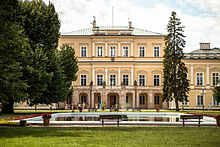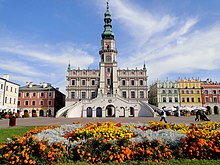Lublin Voivodeship
Cities and towns of greatest historic importance are Lublin, Chełm, Kazimierz Dolny and Zamość.The Jews tended to settle mostly in the cities and towns, with only individual families setting up businesses in the rural regions; this urban/rural division became another factor feeding resentment of the newly arrived economic competitors.Israel's brother, the Nobel prize winner Isaac Bashevis Singer, was not born in Biłgoraj but lived part of his life in the city.Polish people were also victims of German persecution and crimes, including the AB-Aktion, Aktion T4 and Operation Zamość with deportations to Nazi concentration camps, forced labour, kidnapping of children and massacres in the region.There were also German prisoner-of-war camps for Polish, French, Italian, Dutch, Belgian, Senegalese and Soviet prisoners of war in Chełm, Dęblin, Biała Podlaska, Zamość, Kaliłów with several forced labour subcamps, where many died from starvation, epidemics or were massacred.The Gross domestic product (GDP) of the province was 18.5 billion euros in 2018, accounting for 3.7% of Polish economic output.There are seven Historic Monuments of Poland and one World Heritage Site in the voivodeship: There are also many more castles and palaces in the region, including in Adampol, Biała Podlaska, Janowiec, Kock, Lubartów, Łabunie, Łabuńki Pierwsze, Radzyń Podlaski.The Chapel of the Holy Trinity at the Lublin Royal Castle contains some of the oldest and best preserved medieval frescoes in Poland.various types of kiełbasa, bacon and kaszanka), beverages and various dishes and meals, officially protected by the Ministry of Agriculture and Rural Development of Poland.Traditional non-alcoholic drinks include various types of juices, tea, syrups, and hot chocolate from Lublin.











VoivodeshipCoat of armsBrandmarkCountryPolandLublinCountiesBiała PodlaskaChełmZamośćBiała Podlaska CountyBiłgoraj CountyChełm CountyHrubieszów CountyJanów Lubelski CountyKraśnik CountyKrasnystaw CountyŁęczna CountyLubartów CountyLublin CountyŁuków CountyOpole Lubelskie CountyParczew CountyPuławy CountyRadzyń Podlaski CountyRyki CountyŚwidnik CountyTomaszów Lubelski CountyWłodawa CountyZamość CountyExecutive boardVoivodeMarshalJarosław StawiarskiLublin constituencyTime zoneISO 3166 codeVehicle registrationLublin AirportHighwaysgminasPolishprovinceLesser PolandCherven CitiesRed RutheniaPolesiePodlasieSubcarpathian VoivodeshipŚwiętokrzyskie VoivodeshipMasovian VoivodeshipPodlaskie VoivodeshipBelarusBrest RegionUkraineVolyn RegionsPolish historical regionPartitions of PolandKazimierz DolnyPolish–Lithuanian CommonwealthUnion of LublinCrown TribunalLesser Poland ProvinceParczewHorodłoUnion of HorodłoScottishOpole LubelskieArmenianCentral Industrial RegionJudaismKraśnikLubartówŁęcznaŁaszczówIzbicaPuławyBiłgorajIsrael Joshua SingerIsaac Bashevis SingeryeshivaMajdanek concentration campBełżec extermination campSobibór extermination camplabour campsTrawnikiPoniatowaBudzynLipowa 7 campFlugplatzWehrmachtLuftwaffeGerman-occupied EuropecrimesAB-AktionAktion T4Operation ZamośćNazi concentration campskidnapping of childrenZamość uprisingGerman prisoner-of-war campsFrenchSenegaleseDęblinKaliłówforced labourTarnobrzegSiedlcePolish local government reformsBasilica of the Birth of the Virgin MaryZamość Old TownUNESCO World Heritage SiteMiędzyrzec PodlaskiPoland's official national Historic MonumentŚwidnikŁukówTomaszów LubelskiKrasnystawHrubieszówRadzyń PodlaskiWłodawaJanów LubelskiBełżyceTerespolSzczebrzeszynBychawa



